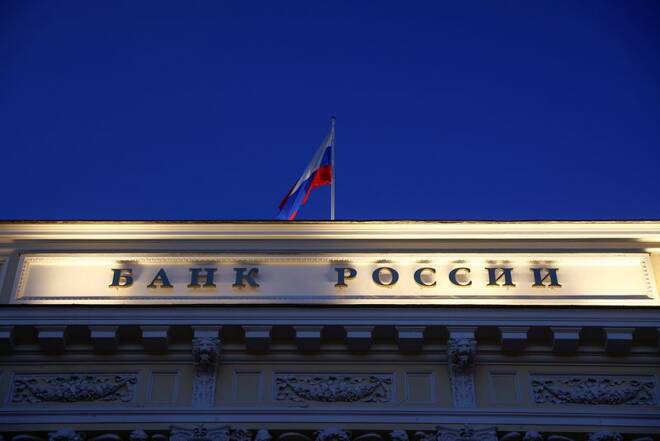Advertisement
Advertisement
Russia sees drop in cross-border payments using dollars, euros
By:
MOSCOW (Reuters) - Around half of Russian cross-border payments are now being made in currencies other than the dollar and euro, up from 21% at the start of the year, the central bank said on Thursday, as Russia tries to wean itself off currencies of so-called unfriendly nations.
MOSCOW (Reuters) -Around half of Russian cross-border payments are now being made in currencies other than the dollar and euro, up from 21% at the start of the year, the Russian central bank said on Thursday, as the country tries to wean itself off currencies of so-called unfriendly nations.
Russia is seeking to reduce transactions with what it terms “toxic” currencies – those of countries that have imposed sanctions on Russia, in particular the dollar and euro. Use of China’s yuan by Russian companies increased dramatically since Feb. 24, when Russia sent thousands of troops into Ukraine.
The yuan has been making gradual inroads in Russia for years, but its progress has accelerated sharply in the past nine months, according to a Reuters review of data and interviews with 10 business and finance players.
Russians have bought 139.6 billion roubles ($2.28 billion)worth of Chinese yuan so far this year, the central bank estimated.
“The population’s preferences in terms of currency are gradually shifting towards the yuan,” the regulator said in a financial stability review published on Thursday.
“The challenge for Russian banks is the limited scope of opportunities in interest-bearing yuan investments,” it said.
“It is also important that the transition to the yuan is balanced, addressing both exports and imports, as well as payments for capital transactions.”
The central bank said sanctions, which include several major Russian banks being cut off from the SWIFT international payments system, were primarily limiting banks’ ability to carry out certain transactions.
“While a considerable portion of export and import payments remain in dollars and euros, these payments are significantly hampered by the fact that a large percentage of banks are under sanctions and cannot carry out such operations,” the bank said in the report.
($1 = 61.2000 roubles)
(Reporting by Alexander Marrow and Elena Fabrichnaya; Editing by Mark Potter and Jane Merriman)
About the Author
Reuterscontributor
Reuters, the news and media division of Thomson Reuters, is the world’s largest international multimedia news provider reaching more than one billion people every day. Reuters provides trusted business, financial, national, and international news to professionals via Thomson Reuters desktops, the world's media organizations, and directly to consumers at Reuters.com and via Reuters TV. Learn more about Thomson Reuters products:
Advertisement
